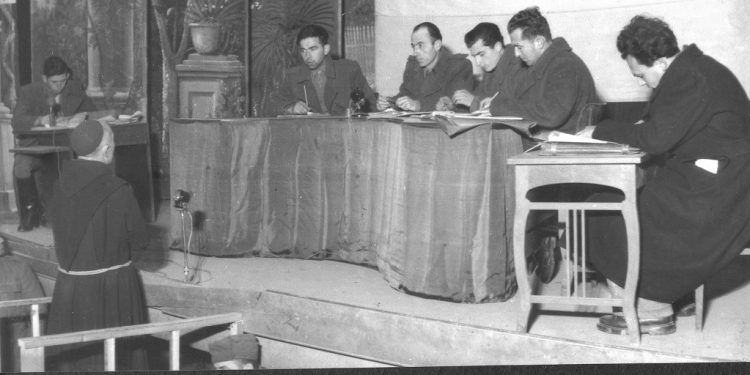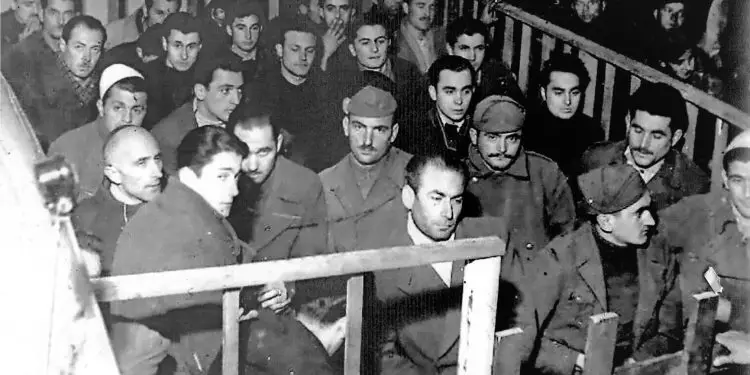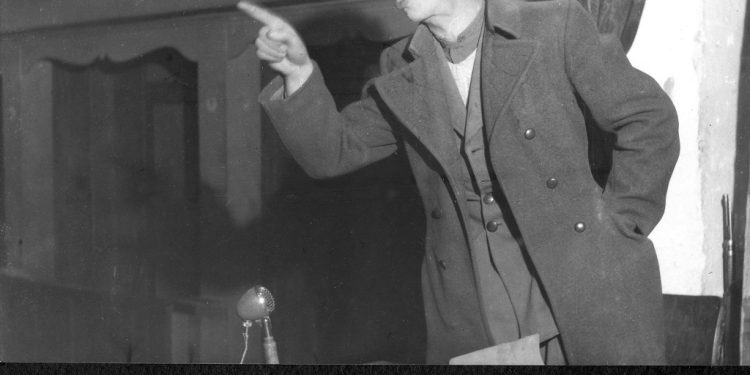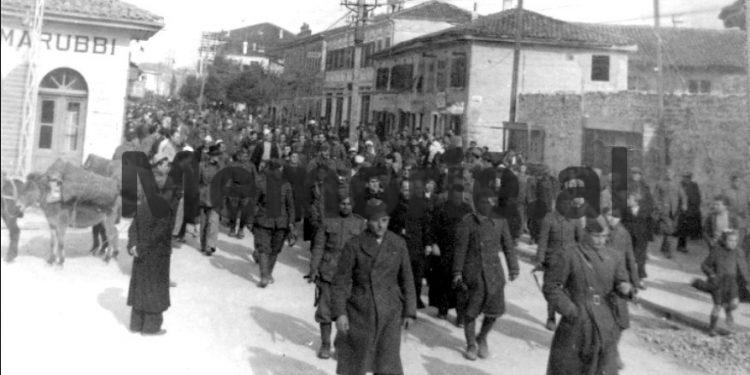By Rudina Lazari
Memorie.al / “A nation that is born needs the fate that it desires. But the fates they want, they have nothing to do in a nation that forgets and despises them”. This is what the director of the magazine “Hylli i Drites” Father Gjon Shllaku would say, in issue 3-4 of this magazine. “On the other hand, ideal people, in drowning for life, are honored for death. Among us they drown twice; they are also forgotten”. Seemingly simple apostrophes, premonitions and prophecies that until recently sounded too sad. On the gloomy, cloudy and rainy morning of Shkodër, on March 4, 1946, the hearts of the people of Shkodër were shaken by the volleys of machine guns and the echoes coming from Zalli i Kiri, the famous place where the “sinners” of the red era were shot.
Under the bullets of the execution squad, the bodies of 7 condemned to death fell to the ground one after the other, among which 4 were Catholic clergy. Father Gjon Shllaku was one of them. It was not the first time that in broad daylight in the city, such additions with “xanun” exercises were heard as those that fall on human flesh.
In the newly acquired custom the shooting of heretics was done in the early hours when the people were still in bed. After the shooting, the bodies of the dead were usually left one on top of the other, as if they were garbage bags, at the disposal of the citizens, for the whole day.
In the twilight of the night, as they were, they were thrown into a common pit, which was well covered so that they could no longer be seen. This was the fate that even Father Jjon Shllaku foresaw in his oblivion. “Tomorrow, together with a colleague of mine, we will go for a walk towards the place of the shooting, in order to prove where they were buried. No sign of a hole or dirt anywhere, we took it fresh.
Later we found out that the pit had been opened at night, near the river bed, in the shingle that the river covers behind the tracks. The excess soil had been thirded and the pit had been leveled carefully, with the edge of the city: tins, tins, in such a way that there would be no evidence or trace of the crime committed”. This is what Pal DukaGjini says in his memoirs about Father John Shllaku. (Literary pseudonym of Father Daniel Gjeçaj).
In Shkoder, Father Gjon Shllaku is known as one of the most intellectual Catholic clerics. Philosopher, journalist, professor, Father Shllaku is also known as a politician. In the history of Christian Democratic thought, Father Gjon Shllaku is said to be the first chairman of the Albanian Democratic Christian Party. It even seems that this was one of the main causes that led him to the end and the inevitable collapse.
The regime could not accept in the course of time, those who were in ideological opposition to it. For people like Father Gjon Shllaku, the fact that he was a priest and part of a select elite of intellectuals was enough.
Erudite who remained in history
The old people remember him very well, although he has not been around since the beginning of March 1946. Remembering his first meeting, with Father Gjon Shllaku, Father Zef Pëllumbi, says; “He was a young man, around thirty, but he was getting old before his time. Short, dry, pale, with a pair of black glasses that covered half of his smiling face.
We didn’t wear them in the body. More medium than tall. With a distressed appearance. The face of an ordinary friar, who gives neither importance nor weight to the external appearance. Pleasant to talk to and full of people. The face and the shape of the head characteristic of the Illyrian race. The bald forehead and thin hair”.
That’s how those who knew Father Gjon Shllaku remember it in their memories. “He knew how to keep himself in the company and in any social environment or order, he kept intact the dignity of the priest, the mastery of the practical philosopher and sociologist, the wealth of an open and deep culture. He had a strong and reflexive mind. He read a lot, and he read a lot, he thought about it with strange ease”, says Pal Dukagjini about him.
An excellent connoisseur of the most mentioned philosophers of the Italian, French and German times, from which he seems to have derived some of his interest, which perhaps for the moments when he appeared, could be called imposed on politics. Willing to discuss any matter of human and literary knowledge. He knew how to get along with everyone, despite the fact that he preferred the intellectuals and smart people of the time.
However, he spoke cordially to everyone the same. In Shkodër, we remember his friendship with Dr. Shiroka, who, in conversation with him even when the occasion arose, used the narrow terminology of the jargons of the human science of man.
Another episode is also well remembered. During a visit of a group of Italian albanologists to Shkodër, Father Gjon Shllaku is the master of the house. In the list that is required to be made for a gift of books, Father Shllaku proves to be an erudite person with culture and literary taste. At the Franciscan Lyceum where he taught, Father Gjoni was considered the most prepared professor. In his time, he was said to be the highest man of Albanian culture.
“I had him as a professor at the ‘Illyricum’ Lyceum and he taught us physico-chemistry, French and political economy. He was the most charming professor. In class, he was talking to us about taking Bastija, which changed the world. Did we understand?… Of course not…”, says Father Zef Pllumi, in his memoirs.
In the direction of the “Hyllit de Drita”, the skill of Padre Gjon stood out brilliantly. Soon the magazine turned into a national forum, with the participation of the most prominent cultural personalities, such as; Eqerem Çabej, L. Mirdita, Kol Naraci, Frano Alkaj, Prek Kaçinari, etc. He gathered around himself the sharpest feathers of the time. In the hearth initiated by the great Fishta, where the platform of a free and advanced Albania was melted, the elders of the canon and young writers, Christian or not, but always, worshipers of a God, sat in the assembly as before.
He accepted modern and progressive ideas, but without avoiding the Christian principles of Albanian culture. In 1945, Shkodra intellectuals organized the conference for the creation of the House of Culture. “Father Gjoni was also invited, which he embraced enthusiastically.
At that conference that elected Father Gjon as honorary president, he gave the inaugural speech, a speech that will remain unforgettable for the audience that day”, says Zef Zorba. Everyone knew Padre Gjoni and were convinced that with such an initiator, culture, economy and art would flourish in independent Albania.
For religion and country
In the leitmotif of the clergy, martyred life for religion and for the country is also known. The martyr known as Gjon Shllaku also had such a life. Born in Shkodër, cradle of culture and center of Christianity, he was named Kolë at his baptism. Still young, he entered the Franciscan College.
In October 1922, he was ordained a priest and began religious life, changing his baptismal name to John. He graduated in the Netherlands and Belgium, at the University of Levain, while in France, at the Sorbonne University, and completed a course in journalism, which will be one of his main goals, directing the Magazine “Hylli i Drita”.
Based on the tradition of Franciscanism in Albania and as a result of the education acquired by the great ones with Zhgun; Bardhi, Gjeçovi, Harapi, Fishta and Rrota, who were teachers in soul and heart, Padre Gjoni influenced young people, not only religious feelings, but also healthy culture and national feelings.
He too, like the fathers of the Franciscan Province, was given life by binomial; “For religion and for the country”. What distinguishes him in his priestly and Franciscan mission is his pen and writing. Katu gave the first evidence of a rare skill and a special talent. He wrote little because of the short time of his activity and the difficult circumstances he found himself in when he entered the ranks of writers.
The Red Curse and the Politics of Religion
In 1946, for the Christian clergy in Albania, the first dramatic act of that tragedy was marked which would slowly lead the church of this country to the complete annihilation of any external expression of faith. “Every day the gloomy clouds grew heavier, which heralded a storm and a storm among us.
I remember like today the sadness that covered us all and the spiritual condition of Father John remained in my mind, now it’s up to me, but unfortunately I’m neither the first nor the last. Let’s pray that God gives us strength and heart to face martyrdom”, says Pal Dukagjini. The accusations were ready. He had democratic Christian ideals.
According to some indicators, at the end of 1945, Sejfulla Malëshova was seen in Shkodër. It is said and even documented that he talked with Father John Shllaku about the creation of a Christian Democratic Party. These were the arguments that were brought to the Farsi court against the venerable priest. One of the translators in the service of Enver Hoxha, says that she heard a conversation between Hoxha and the Yugoslav ambassador.
“We strangled Father Anton Harapi and, with this, we mortally wounded the Catholic Clergy”. According to the woman’s confession, the Serbian diplomat replied; “Yes! Yes! But you still have Father John Shllaku alive, who weighs a lot. It is necessary, according to the order of the government, to eliminate Shllak and destroy the top, and the foundation, the nursery of the Catholic Clergy in Shkodër”.
They took him in February 1946. They took him out of the classroom while he was teaching students. You didn’t even manage to write the topic in the class register. That night on Radio Shkodra, the news was given that; “Criminal Gjon Shllaku, who was caught crossing the border, to escape”. From that moment on, he changed the teacher’s lounge to the torture chamber.
“When the rest of us finished the lesson in ten minutes, everyone was speechless. Father Gjoni also saw it”, says Pal Dukagjini, in his memoirs. Now Father Gjoni joined other victims, waiting to be taken out to the arena of the Colosseum of Rozafa. It added the line of Father Daniel Dajani and Father Faust, “members of the anti-popular organization, ‘Albanian Union'”.
He was also accused of being the chairman of the Christian Democratic Party, in its early days. At the trial there was a courageous and highly prepared lawyer, both intellectually and professionally, Myzafer Pipën. This was his former student, he knew Father Shllaku’s personality and it was not difficult to defend him, even though there were consequences from him.
According to Pal Dukagjin’s memories, Myzafer Pipa agreed to defend Father Gjon and in a comment, he said; “What can a lawyer do, where there are no laws and no justice?! How can a man defend himself, where and when, before his guilt is proven or not, he is condemned”?!
A tragicomic trial. Father John is sentenced to death. Accusations planned from above, Father Gjon presented, as; “the ideologist and creator of the Democratic Party, as well as; “the organizer and leader of the “Albanian Union”.
Guilty to death, not only as an opponent of the regime, but also as; “criminal and person harmful to the people and the nation”. The death sentence had already come from official Tirana. After that, the execution was routine. Memorie.al















